Recent Storm Damage Posts
Does My Commercial Insurance Policy Cover Floods and Hurricanes?
10/1/2022 (Permalink)
 Damage from flooding is different from hurricane damage. In many cases, the damage caused by hurricanes results from storm surges and rising water.
Damage from flooding is different from hurricane damage. In many cases, the damage caused by hurricanes results from storm surges and rising water.
Is Flooding And Hurricanes Covered By My Commercial Insurance Policy?
Business owners in Hillsboro Beach, FL, might think their commercial insurance covers damage from hurricanes and floods. In many cases, though, you need to purchase separate coverage. Here are a few types of damage for which you may need separate storm insurance.
Hurricane Damage
This type of insurance coverage is currently a mandatory deductible in 19 states and the District of Columbia. It is a percentage deductible based on the value of your property. The cost of this coverage varies depending on your provider and where your property is located in relation to the coastline.
Hurricane insurance typically covers your building or structure and its contents for cleanup and storm damage restoration, including:
- Inventory
- Computers
- Electronic equipment
- Furniture
- Fixtures
- Cargo
Check your policy to see if passenger vehicles and machinery are included. Often, you need a separate policy to cover these items.
Wind and Hail Damage
Insurance coverage for hail and wind damage is included in standard property insurance for most of the country. In coastal areas, business owners may need to purchase separate storm insurance for these types of perils. Wind and hail damage may be covered under a hurricane policy.
Flood Damage
Damage from flooding is different from hurricane damage. In many cases, the damage caused by hurricanes results from storm surge and rising water. When damage results from water on the ground, it is considered flood damage.
You can purchase flood insurance through the National Flood Insurance Program, or NFIP. The program is managed by FEMA and offers insurance in participating communities through a network of companies.
If your business is in a high-risk flood area and has a mortgage through a government-backed lender, you must have flood insurance coverage.
It's best to review your policy from time to time to ensure you have the right storm insurance for the types of perils that can happen to your Hillsboro Beach, FL, business.
3 Tips for Cleaning Your Store Inventory After a Flood
7/19/2022 (Permalink)
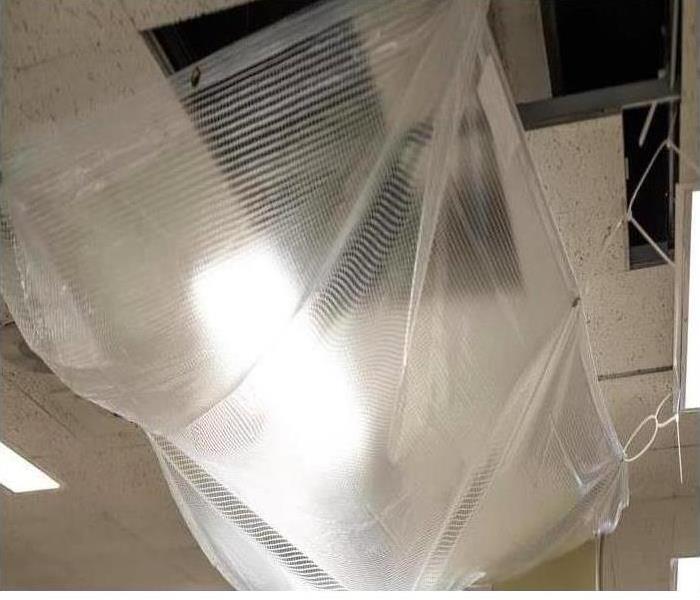 Ceiling damaged after a storm in Lighthouse Point, FL.
Ceiling damaged after a storm in Lighthouse Point, FL.
3 Tips for Cleaning Your Store Inventory After a Flood
When violent storms in Lighthouse Point, FL, affect your business and cause flooding, your inventory could suffer such serious damage that you may not know where to begin with cleanup efforts. Knowing which items might be salvaged for content cleaning and which must be thrown away can be a confusing process, but there are a few tips you can keep in mind as you sort through your items.
1. Porous Items Are Not Usually Salvageable
When floods occur during a storm, the water source is likely either runoff from overflowing nearby rivers or creeks or from backed-up sewage drains that are heavily taxed by torrential rain. In either case, the water is likely contaminated with chemicals and human and animal waste and is known as black water because of its source. As such, you may not be able to salvage porous items because of the danger of contamination, including:
- Many plastics
- Drywall
- Clothing
If you are unsure about any item you wish to salvage, you can ask your local flood restoration service whether it is porous and may retain contaminated floodwater.
2. Make a List of Salvaged Items
As you clean up after a flood, you may want to track your salvaged items and keep a list of those you want to save. While paper items are porous, a storm damage and flood restoration service may be able to help you rescue important documents by freezing and decontaminating them. This type of content cleaning may help you avoid losing customer data, employee records and other vital information.
3. Set Aside Electronic Devices
Your store's electronic items such as cash registers, credit card machines, and computers may suffer considerably during flooding. However, depending on the degree of water damage, you may be able to salvage and repair them to lower any insurance claim deductibles. Avoid throwing away any electronics until you speak to a professional content cleaning service.
When major storms strike Lighthouse Point, FL, they can cause flooding that may affect your business. Keeping the above tips in mind as you begin the cleanup process may help you feel more confident about the outcome.
5 Questions and Answers About Flooded Drywall
6/29/2022 (Permalink)
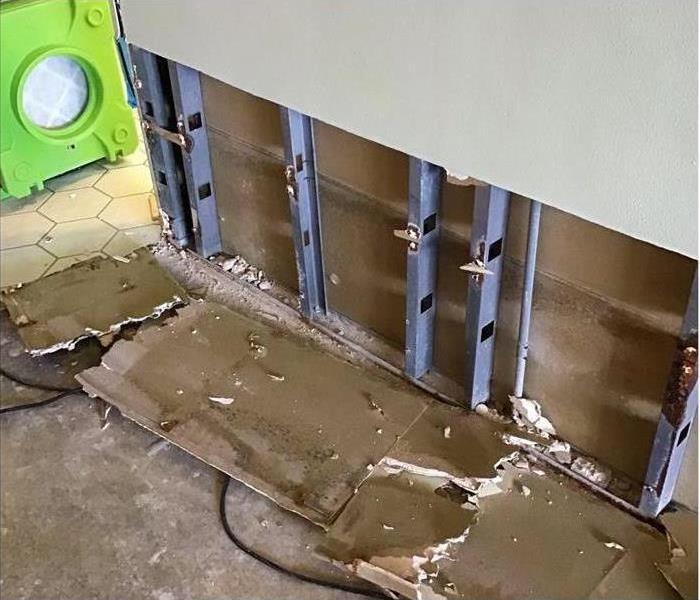 When drywall, or plasterboard, gets very wet, or when it is wet for a long time, it loses structural integrity.
When drywall, or plasterboard, gets very wet, or when it is wet for a long time, it loses structural integrity.
Flooded Drywall Questions and Answers
After flooding has receded, you may need to complete some reconstruction in your home. Take a look at some common questions about removing drywall.
1. What Is a Flood Cut?
When your home has been damaged by flood waters, the water restoration professionals in Lighthouse Point, FL, will cut out the wall at least 12 inches above where flood damage stopped. This is called a flood cut.
2. What Happens When Drywall Gets Wet?
When drywall, or plasterboard, gets very wet, or when it is wet for a long time, it loses structural integrity. When this happens, the wall becomes soft and weak. Additionally, the area could see mold growth and become discolored or smelly.
3. Is It Necessary To Tear Out Wet Wallboard?
A speedy response may save the wall. However, if the drywall has obviously absorbed moisture, or if it is soft, stained, obviously wet, or smelly, it must be removed and replaced. This job can expose you to hazards. Instead of taking personal risks, contact a local water damage specialist.
4. What Are the Main Concerns With Flooded Walls?
Flooding carries a high risk of contamination. Flood waters may carry infectious diseases, chemicals, and other pollutants. These can lead to problems for your family if those contaminants are allowed to remain in your home after soaking into the plasterboard.
5. Should Drywall Be Recycled or Destroyed?
Some plasterboard can be recycled if it consists of gypsum powder and paper (as well as some additives). Unfortunately, most of the drywall pulled out ends up in landfills. Some water restoration professionals will haul the materials off for you. If not, reach out to an appropriate source for recycling.
Flooding leads to many concerns, but contaminated drywall shouldn't be a serious problem. Don't wait for further trouble before you take action. Instead, contact water reconstruction professionals in Lighthouse Point, FL, to put your home back in shape.
Do I Need Commercial Flood Insurance?
6/1/2022 (Permalink)
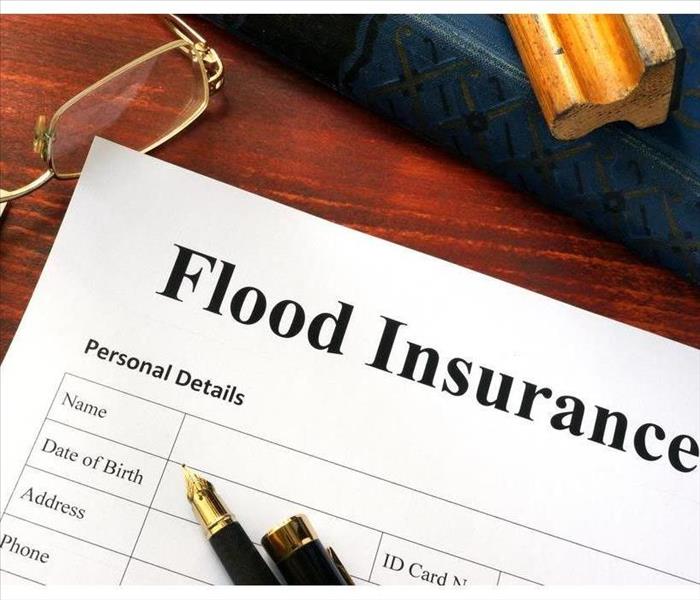 Depending on your location and risk factors, you may want to invest in a flood policy.
Depending on your location and risk factors, you may want to invest in a flood policy.
Do I Need Flood Insurance for My Business?
Your business is your livelihood, and you want to be certain that you have all the right insurance in place to protect that livelihood if something goes wrong. Most likely, you’ve purchased at least one commercial insurance policy, such as commercial property insurance, commercial liability insurance, or business interruption insurance. What about flood insurance? Depending on your location and risk factors, you may want to invest in a flood policy.
Is Flood Coverage Required For My Business?
To determine whether your business is required to have a flood policy in addition to your commercial property insurance, ask yourself these three questions:
- Is there a mortgage on the property?
- Is that mortgage with an FDIC-insured lender?
- Is the business property located in a high-risk FEMA flood zone? (You can check your flood zone designation on the FEMA website.)
If you answered “yes” to all three questions, then flood coverage is likely mandatory for your business property. Of course, even if you’re not required to maintain flood insurance, a flood policy may still be a wise decision.
What Counts As a Flood?
Commercial property insurance specifically excludes coverage for “flood” events. A flood, in the insurance world, means water that comes from sources such as:
- overflowing lakes or rivers
- snowmelt
- broken levees
- storm surges
- heavy rain
- failed dams
In addition to coming from an eligible source, the water must also either cover two acres or more of land or affect two or more properties.
What Does a Flood Policy Cover?
Coverage varies somewhat from policy to policy, but generally, flood policies cover damage to your business property, equipment, and inventory when the damage is caused by an eligible flood event. Most policies will also cover the cost of professional mold remediation if you act quickly enough after the flooding.
If your Lighthouse Point, FL, business is in a flood zone, flood plain, or at risk of flooding, or even just as a protective measure, flood insurance may be a smart choice to protect your assets.
How To Keep Your Business Safe During a Storm
4/3/2022 (Permalink)
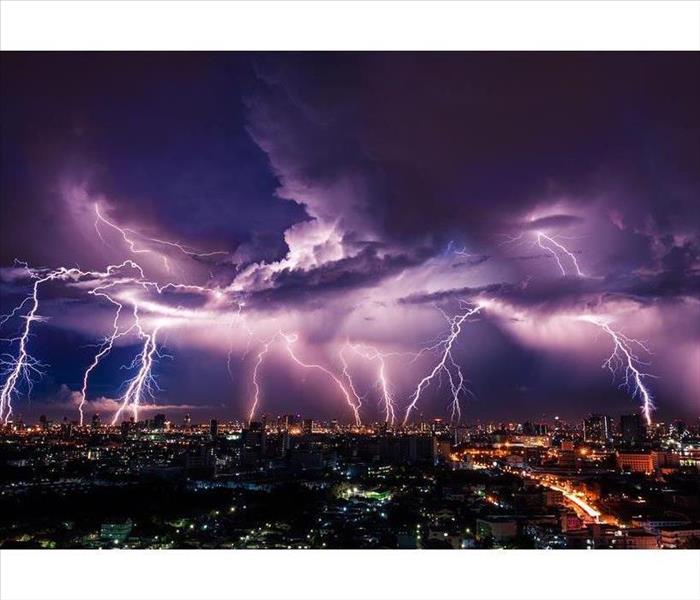 It is important to prepare if you know a storm is coming. Staying up to date on the weather can help you know when to expect severe weather.
It is important to prepare if you know a storm is coming. Staying up to date on the weather can help you know when to expect severe weather.
How To Protect Your Business During A Storm
A severe rain storm in Deerfield Beach, FL, can be a threat to your commercial building if you are not properly prepared. Use these tips to help stay alert and prepared for any severe weather that may come your way.
Get Prepared
It’s important to prepare yourself if you know a storm is coming. Staying up to date on the weather using an app on your phone or a local news station can help you know when to expect severe weather.
It’s important to know the difference between a severe weather watch versus a warning to stay properly prepared. A watch means that conditions that could cause severe weather are expected, while a warning means that meteorologists have already spotted a severe storm. Some signs of a severe storm include:
- Large and puffy
- Cumulus clouds
- Darkening skies
- A sudden drop in temperature
- Sudden change in wind direction
If you notice any of these signs, distant rumbles of thunder or lightning, it means a thunder or rain storm may be approaching.
Secure Your Building
If a storm is coming, it’s important to make sure that your building is secure to avoid damages. This may include things like trimming trees to get rid of dead or rotting branches that can cause damage during periods of high winds. Any fixtures outside that may get blown away should be gathered up and moved to a safe place. Get all employees inside and make sure any windows and doors are locked or securely shut. If you know there is a thunderstorm coming, unplug any unnecessary electronics to prevent damage from lightning.
Endure the Storm Safely
During a severe rain storm, your most important concern should be keeping yourself and your employees safe. This means keeping everyone away from windows or skylights and avoiding plumbing fixtures that may conduct electricity.
If you live in an area that has frequent severe weather, it may be beneficial to have policies and procedures for your commercial building during storms so that all your employees stay safe.
Keep your business safe during severe weather with these tips.
Is Your Company Prepared for a Disaster?
11/15/2021 (Permalink)
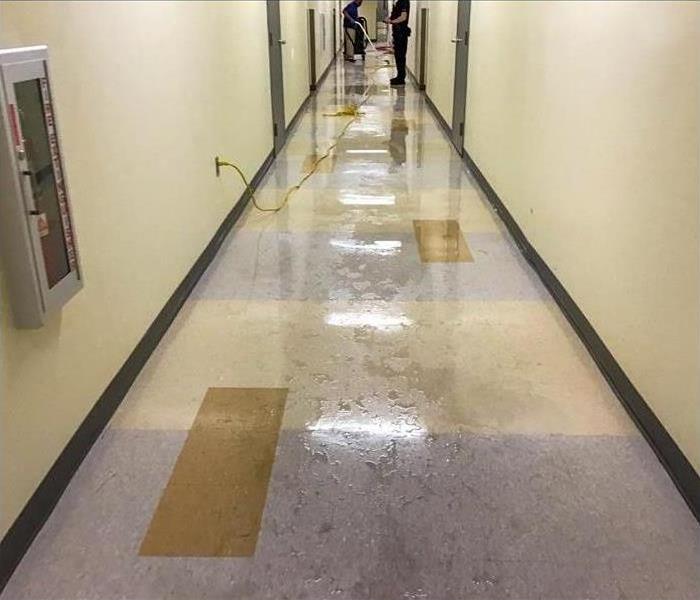 This building's roof was affected during a severe storm, impacting the ceiling beneath it. Fortunately, SERVPRO cleaned and restored the place.
This building's roof was affected during a severe storm, impacting the ceiling beneath it. Fortunately, SERVPRO cleaned and restored the place.
Is Your Business Ready for a Disaster?
If you own a business in Lighthouse Point, FL, you need to be prepared for any eventuality. A disaster preparedness plan is essential to making sure you and your employees will be safe and your business secure in an emergency situation. Below are some steps you should take to be ready.
1. Plan for Continuity
Business preparedness begins with making sure your company can continue to operate after the disaster has occurred. This means assessing how the company functions, and what equipment and procedures are essential to keep operations functioning. Make a succession of management plan, and have lists of suppliers, shippers and other business resources available in a secure place. Good disaster preparedness also includes having a backup plan for alternate sources in case these key business partners are temporarily unable to work with you. Have a plan for being able to continue to serve your most important customers while your business recovers. Also, review your insurance to ensure that you're covered for any eventuality.
2. Secure Your Building
In addition to consulting with a commercial storm company to conduct a building inspection, you should make sure that you've planned ahead for security and safety. Have generators ready to go in case electricity is disrupted, and see that you have working fire extinguishers and smoke detectors in place. All equipment and large items should be secured, and utility equipment should be raised above ground level to protect it from flooding.
3. Keep Employees Safe
Make sure your employees know what to do in case of emergency. Conduct periodic safety drills and provide training to develop preparedness skills such as first aid and CPR. Have a detailed evacuation plan worked out, but also be prepared for situations where people may have to remain in the building. Stock a complete inventory of emergency items, such as first aid kits, blankets and pillows, battery-powered radios or TVs, and a sufficient supply of food and water.
By following the suggestions outlined above and developing a comprehensive disaster preparedness plan, you can be ready for any eventuality and make sure your company can weather the storm.
Storm Preparation Tips for Homeowners
9/19/2021 (Permalink)
 Floodwater can be dangerous as well as inconvenient.
Floodwater can be dangerous as well as inconvenient.
Forewarned is forearmed, as the saying goes, and residents of Deerfield Beach, FL, who monitor the weather are taking the first step toward protecting their homes from the ravages of floodwater and other storm and water damage. With free weather apps available, it is easier than ever to stay updated on what Mother Nature is cooking up.
Routine Maintenance
Even before it becomes known that a storm is on the way, there are many proactive measures that homeowners can take to prevent or minimize damage. Investing a bit of time and effort when the weather is calm is likely to deliver benefits when things get dicey.
• Monitor the condition of storm drains to ensure they are not blocked.
• Regularly inspect gutters and downspouts for any debris that impedes drainage.
• Regularly maintain and test sump pumps and submersible pumps to keep them in working order in the event that floodwater invades the home.
• Keep tree branches near roofs and windows trimmed.
• Consider elevating appliances commonly found in basements such as washers, dryers, water heaters, and dehumidifiers.
Storm Preparation
In the days or perhaps hours before a weather event is predicted, further steps can be taken to prepare for a possible inundation and a flooded building. Monitor the forecast and ramp up efforts to protect the home front.
• Fill the car with gas and assemble medications, food, drinking water, pet supplies, important papers and phones, and their chargers in case evacuation is required.
• Develop a communication plan with family members.
• Stay tuned to weather reports for further information and instructions.
• Secure outdoor furniture and other belongings that could be displaced by wind or water.
• Stay indoors during the duration of the storm and do not wade or drive through standing water.
Floodwater can be dangerous as well as inconvenient. Keep the focus on preparation and safety. When the time comes for remediation, professionals will be there to help.
Sewage Backup and Cleaning in Deerfield Beach, FL
8/9/2021 (Permalink)
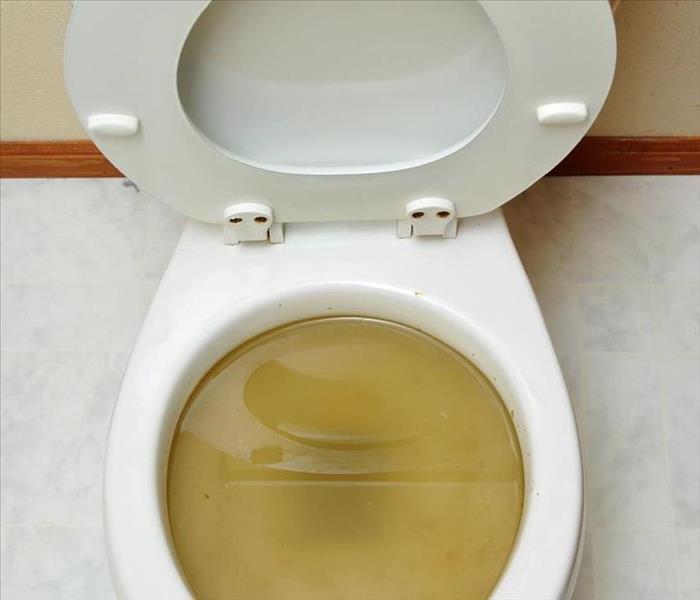 A toilet that refuses to flush is a warning sign of a sewer back-Up
A toilet that refuses to flush is a warning sign of a sewer back-Up
The Early Warning Signs Of A Sewer Back-Up
Heavy storms and the accompanying rain water can create problems for homeowners, as sewage systems within Deerfield Beach, FL, might be suddenly tasked with draining more water than they were designed to handle. Too much water being forced through a narrow opening can actually create the reverse effect of pushing water backwards, causing a sewer backup that affects residential properties. If your house is experiencing backflow problems, look for these noticeable signs.
1. Multiple drains will experience a clog. It is common to find a blockage when too much hair, debris, or food particles have made their home in a drain pipe, but to find several clogs at the same time is an indication of a deeper issue.
2. Water will backflow out of other drains. If you notice water gurgling from your kitchen drain after running the dishwater, or find black water filling the shower floor after flushing the toilet, you can be certain of a sewer backup. The draining water has encountered a block and it is looking for an alternate escape route.
3. Flushing the toilet is difficult. Should your toilet refuse to flush, and you have unsuccessfully tried plunging, you may have a bigger problem. Having some bubbling in the toilet bowl is normal, yet excessive bubbling that occurs after flushing or when draining water in another part of the house is also a sign of a problem.
In addition to clogged drains and bubbling backflow in kitchens and bathrooms, check your basement or lower-level rooms for standing water, being careful to avoid situations where electricity is present. Drainage problems can often trigger flooding in these areas where a laundry drain might be.
It is vital you call in the experts as soon as possible to keep your family safe. Sewer backup brings wastewater into the home, creating unsanitary conditions for families regardless of where the water enters. If storms are threatening the Deerfield Beach, FL, area, stay alert for these signs of backup.
3 Common Things Business Continuity Plans Miss
6/11/2021 (Permalink)
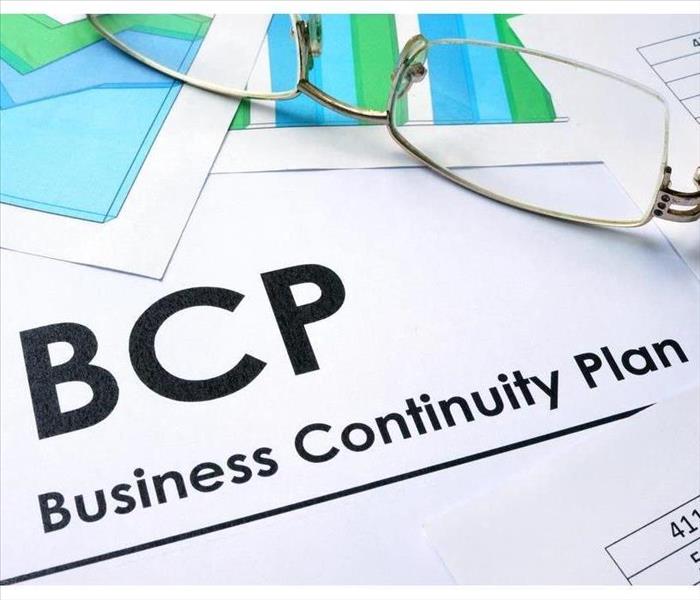 With a great continuity plan, a business can weather a crisis event with minimal disruption.
With a great continuity plan, a business can weather a crisis event with minimal disruption.
3 Common Things Business Continuity Plans Miss
Businesses in Deerfield Beach, FL know the importance of making a business continuity plan. Keeping a business afloat after a disaster requires careful planning and execution. Here are three common things business continuity teams forget while making their plan.
Keeping Documentation Safe and Secure
In the event of a crisis, the plan needs to be ready and available to whoever needs it. All the planning in the world is not going to help if the team handling a crisis is unable to get plan documentation. Don't keep the only copy of the plan in the basement that is prone to flooding. Make sure each member of the business continuity team has a copy of plan documentation and knows where to find backup copies.
Training Employees on the Plan
The business continuity team can come up with a great continuity plan, but forget to train their employees. Although they may not need to know everything about the plan, employees need training on what to do in the event of a crisis. Where should they evacuate or seek shelter? Do they have responsibilities for security or loss prevention? All of these topics should be covered in employee training.
Following Up After a Crisis
After a business has survived a crisis, many get wrapped up in all the difficult details of getting back to work. Businesses need to keep in mind that this is also the time to follow up on your continuity plan and review what did and did not work. Could you improve employee training for a crisis? Did storm damage impact the parts of your building you expected? Was the damage restoration service you used fast and effective? Follow up on your plan and update anything that did not work well.
With a great continuity plan, a business can weather a crisis event with minimal disruption. Better planning will make the process smoother and recovery easier.
Steps to Take After Storm Damage to Your Deerfield Beach Home
5/2/2021 (Permalink)
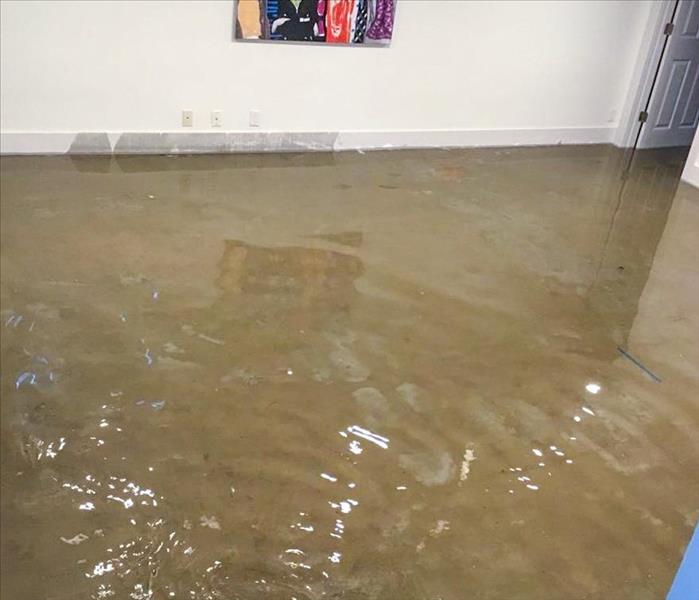 Storms and flooding don’t wait for regular business hours and neither do we.
Storms and flooding don’t wait for regular business hours and neither do we.
Preparing for heavy storms is crucial in Deerfield Beach especially during hurricane season. However, preparations can fall short and homes are devastated by significant storm damage. If your home is experiencing damage to its structure, flooding, or leaks, make sure to follow these tips until help arrives.
1. Stay Safe
Check for any safety hazards including broken glass or possible debris that has gotten into the house. Always be sure to take caution around electrical appliances and never attempt to unplug anything without a professional.
2. Assess Damage
After the area has been deemed safe, take note of the damage. While it takes a trained professional and equipment to completely establish the extent of damage, there is visible damage you can record. Make lists of valuables that have been affected for your insurance. Be sure to take pictures as part of the documentation process. Keeping track of all of your valuables also helps in the case that a restoration company needs to provide pack out services.
3. Make Temporary Repairs
If possible, cover any areas that may be worsening the storm damage. This can be boarding up windows or placing tarp on your roof, if it is safe to do.
4. Call for Help
Contact your insurance company and let them know of your situation as well as the potential damage. Your insurance company will work with you to put you in contact with professional damage restoration services.
If you are not provided with a preferred partner or referrals, call a company like SERVPRO of Deerfield Beach. Our team can direct you on next steps. We will ask you preliminary questions to better understand your situation before sending a crew out to assess your home and determine restoration needed.
Feelings of being overwhelmed or lost might occur at first but following these steps can help get you on track to restoring your home. Acting quickly is imperative to prevent any further loss. Recovering after a storm may take time, though SERVPRO of Deerfield Beach works to restore your home back to its preloss condition. . During this time it is most important to keep yourself and your family safe, while the professionals do what they can to make it “Like it never even happened.”
What to do after flooding
4/16/2021 (Permalink)
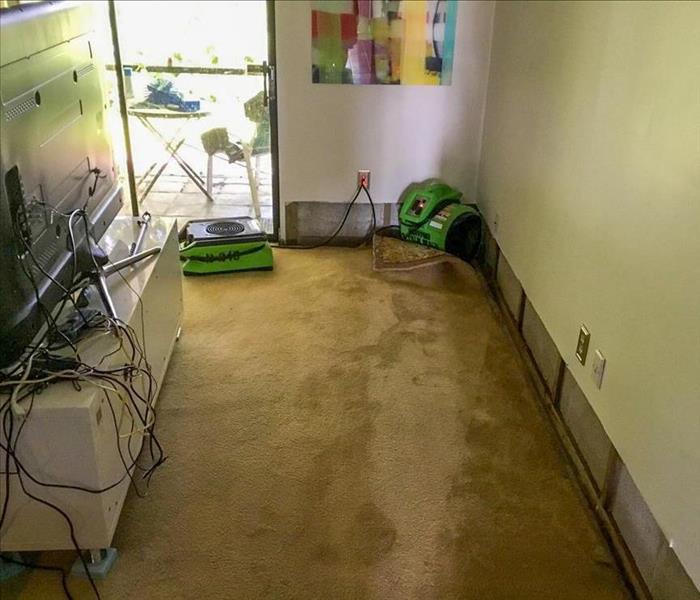 SERVPRO of Deerfield Beach is close by and ready to respond to your flood or water damage emergency.
SERVPRO of Deerfield Beach is close by and ready to respond to your flood or water damage emergency.
What To Do After Flooding
If you ever experience flooding in your Deerfield Beach home, it's important that you know what to do.
- Remove excess water by mopping and blotting.
- Wipe excess water from wood furniture after removal of lamps and tabletop items.
- Remove and prop wet upholstery and cushions.
- Place aluminum foil or wood blocks between furniture legs and wet carpeting.
- Turn air conditioning on to remove moisture from the air.
- Remove colored rugs from wet carpeting.
- Remove art objects to a safe, dry place.
- Gather loose items from floors.
What NOT To Do After Flooding
- Don't leave wet fabrics in place. Hang furs and leather goods.
- Don't leave books, magazines or other colored items on wet carpet or floors, they could begin to grow mold.
- Don't use your household vacuum to remove water.
- Don't use television or other household appliances.
- Don't turn on ceiling fixtures if ceiling is wet, and keep out of rooms where ceilings are sagging.
Hurricane Season is Not Over Yet
3/26/2021 (Permalink)
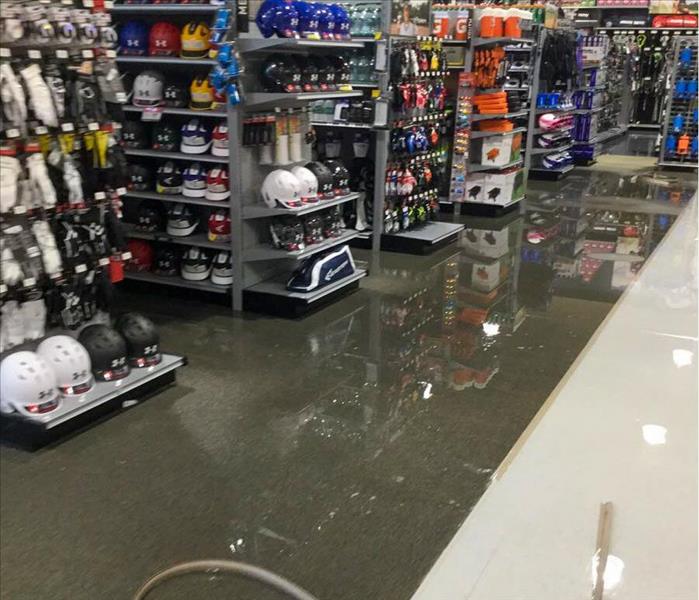 We can cleanup any sized storm damage emergency.
We can cleanup any sized storm damage emergency.
The 2019 hurricane season has not brought about much noise for the East Coast in Florida. Thankfully, many parts in Florida only endured heavy rains and winds during Hurricane Dorian, leaving little to no damage in its path. While there is relief in knowing we were not severely affected, our guard should not be let down just yet.
Hurricane season does not officially end until November 30th, leaving about two months' time for storms to potentially develop. As we saw in Deerfield Beach, FL with Hurricane Dorian, anything goes with nature and we should not allow ourselves to be underprepared. There are a few tips that are necessary to follow in the coming months.
- You might have already gone through your supply of hurricane snacks, but it does not hurt to replenish your stock. If keeping emergency food in your pantry is too tempting, purchase canned goods, crackers, or soups that can be easily placed in a bin and kept in storage.
- As with many storms, water is always found in short supply. Bottled water does not go bad and can also be kept in storage when pre-purchased.
- Candles, batteries, and flashlights meant for emergency purposes should not be utilized unless there is an absolute need to do so. Keeping plenty of these items on hand, in unused conditions will help you in an emergency later.
- Make sure your family has an evacuation plan and bags packed. If mandatory or voluntary evacuations begin, your family can quickly leave in a moment’s notice with your valuables and personal items.
- Have a plan for your business and home’s safety as well. Contingency plans are a resource for a reason. Create your own contingency plan or use SERVPRO’s Emergency Ready Plan. This will help to keep inventory of your home or business’ belongings, track all important documents, and help you in staying organized in the case a disaster strikes.
Unpreparedness allows for vulnerability when it comes to hurricanes and other natural disasters. Staying ready means less work to do in the case of a sudden tropical storm or hurricane. Be safe and vigilant through the remainder of the 2019 hurricane season.
Who to Call After a Storm
3/24/2021 (Permalink)
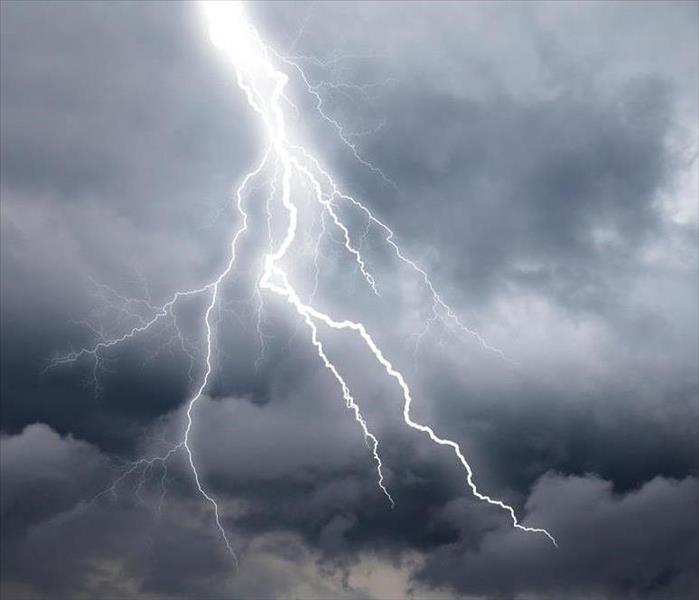 Storms and flooding don’t wait for regular business hours and neither do we.
Storms and flooding don’t wait for regular business hours and neither do we.
When a storm strikes, rain can flood your Deerfield Beach home, breeze can knock trees over onto your rooftop, lightning can cause a fire and hail can harm your rooftop or windows, there is more garbage in your yard from your neighbor’s property than your own. It is at this point to call SERVPRO of Deerfield Beach to help fix your home or business from these damages and bring you back to like it never even happened. We make sure to be prompt and efficient in starting cleanup and repairs. Once our team arrives, it becomes our job and you may take a sigh of relief. There is no storm or flooding job too big or too small for us. All of our jobs are important, and it is our mission to complete them to our customers utmost satisfaction. We end when we see a smile on your face
We can help you with:
- Tornadoes
- Thunderstorms
- Hurricanes
- Snowstorms
- Hailstorms
- Rainstorms
SERVPRO of Deerfield Beach has experience restoring homes affected by storms and flooding and we're available 24/7, 365 days a year. Major storms and flooding events can overwhelm many restoration companies, but SERVPRO of Deerfield Beach responds immediately with highly trained technicians who employ specialized equipment and techniques to restore your home or business back to pre-storm condition.
Preparing Your Deerfield Beach Home and Business Before the Next Storm
8/20/2020 (Permalink)
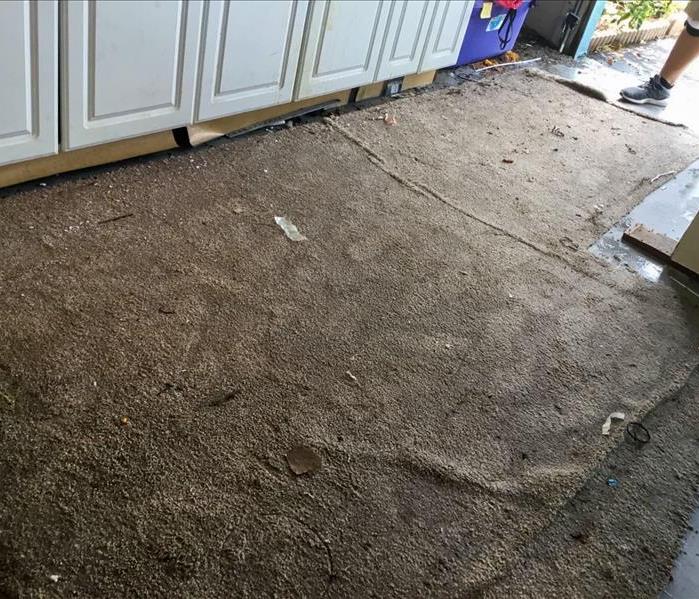 Major storms and flooding events can overwhelm many restoration companies, but SERVPRO of Deerfield Beach responds immediately
Major storms and flooding events can overwhelm many restoration companies, but SERVPRO of Deerfield Beach responds immediately
In the months of August and September, Deerfield Beach finds itself right in the middle of peak storm season. The activity in the Atlantic this week is enough to prove that fact. Currently, there are three systems in the Atlantic, two are barreling toward the United States, with Tropical Depression 13 projected to make contact with South Florida. While it is still too early to determine whether it will make landfall and at what strength, the possibility of it hitting should move Deerfield Beach residents and business owners to prepare.
Prior to the beginning of the 2020 storm season, experts predicted it to be an above average season in activity. Now, the number of storms has increased to 25 named storms, including the 9 storms that have already been named. Hurricane Isaias was the most recent storm in which Floridians were anticipating. Isaias was expected to hit South Florida, however it stayed in the Atlantic, only bringing heavy rain and wind. Many residents and business owners were relieved that Isaias did not hit because they felt severely unprepared. Though South Florida is no stranger to tropical storms or hurricanes, preparations for this year’s storm season was impacted by the current pandemic. Businesses and homeowners alike have been overwhelmed with challenges the pandemic has brought on.
Focusing on more than just COVID-19 and its effects is understandably difficult. Though if this pandemic has taught many people anything it is always to prepare for the unexpected. Storm season is no exception. It has been made apparent by this week’s activity that tropical cyclones can easily form and quickly move. Remaining prepared is essential especially when it comes to the health and safety of yourself and loved ones.
- Have an Emergency Kit ready to go at all times with enough supplies for everyone in your home. Include personal protection items like extra masks and sanitizers in your kit.
- Secure and fortify your home and property.
- Have an evacuation plan and communicate it with your family.
- Prepare your business and employees. Make sure you have read through your insurance policies, understand them and have adequate coverage.
In a time when there is so much uncertainty, being prepared for a hurricane is a priority.
 Damage from flooding is different from hurricane damage. In many cases, the damage caused by hurricanes results from storm surges and rising water.
Damage from flooding is different from hurricane damage. In many cases, the damage caused by hurricanes results from storm surges and rising water.



 24/7 Emergency Service
24/7 Emergency Service











